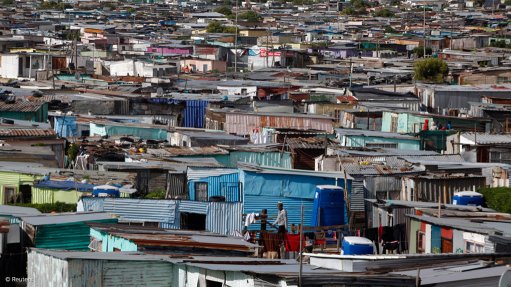
Photo by: Reuters
Centre for Development and Enterprise (CDE) executive director Ann Bernstein explained on Tuesday that South Africa cannot afford a Basic Income Grant (BIG), as it would be a “reckless, losing gamble with history”.
She was speaking during the release of the CDE’s ‘Poverty and a Basic Income Grant: Six questions about a BIG’ report, which highlighted that, in contrast to what proponents of a BIG claim, it would actually slow economic growth.
“Poverty rates in South Africa are exceptionally high and it is possible that the incomes of over 60% of people fall below the poverty line. In this context, and with growing reports of child hunger, it is not surprising that people want to see much more spending on social grants,” she said.
Bernstein noted, however, that government’s finances were already unsustainable, and that a large and permanent new spending programme would worsen matters.
South Africa redistributes a greater share of gross domestic product (GDP) than other developing countries. As a share of GDP, cash transfers are three times larger than the average for the developing world.
While cash transfers to poor households would increase their spending, the higher taxes or increased borrowing needed to finance a BIG would slow the economy and worsen economic sustainability, the report explained.
“Slower growth and increased borrowing would increase the debt ratio. Since 2008, government’s debt has risen from about 26% of GDP to about 70% – a rise that is among the steepest in the world,” Bernstein said.
Further, she mentioned that there was no consensus about how much a BIG would cost. The Social Relief of Distress (SRD) grant costs about R44-billion a year, but proponents of a BIG want a much larger grant for which more people would be eligible, likely costing between R200-billion and R300-billion a year, Bernstein averred.
She said while some people thought that implementing a BIG was just a matter of raising taxes, she explained that higher taxes will slow growth and reduce employment.
She added that the slowdown in growth would make the rest of government’s spending even less affordable than it is and the consequences of that would be terrible for the poor.
The report noted that faster economic growth was essential for stabilising the country’s public finances, and would also make greater spending on social grants more affordable.
“But you can’t spend money as if growth has already accelerated. If you did that, you could tip the economy into fiscal or financial crisis, which would only make the prospects of the poor even worse,” she said.
She noted that there was no short-cut to prosperity and there were no magical solutions to unemployment and poverty.
The full report can be accessed here.